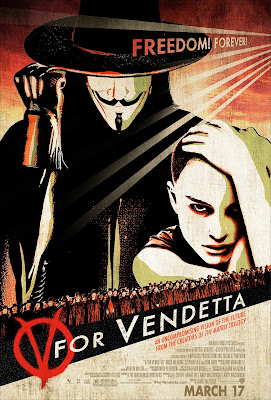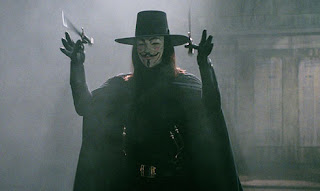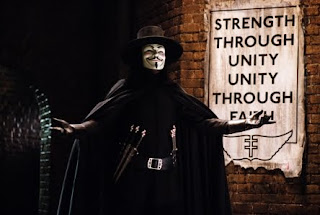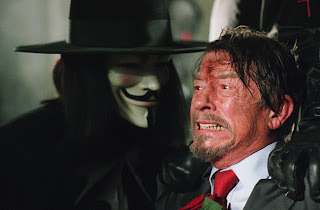I was shocked to discover I haven't written a single word about V For Vendetta since its release back in 2006. I really, really enjoyed the movie back then, and recently re-watched it with a friend of mine who had never seen it. So consider this my very late review.*
V For Vendetta
Director: James McTeigue
Starring: Natalie Portman, Hugo Weaving, John Hurt, Stephen Rea
Based on Alan Moore's comic book series of the same name, V For Vendetta takes place in a futuristic dystopian United Kingdom ruled by a totalitarian government. As a terrorist known only as "V" (Weaving) sets plans in motion to bring the power back to the people, he saves the young Evey Hammond (Portman), who becomes embroiled in the plot over the course of a year. Simultaneously, two detectives attempt to find V and, in the process, discover the horrifying cause of their country's current state.
(Spoilers throughout.)
As previously stated, I really dug this movie when it first came out. I found it interesting that a film could balance a quasi-superhero movie (with all of the action and slow motion that comes along with that genre) with the notion of "making you think" by presenting all of these political ideas alongside the action conventions. "But that Guy Fawkes poem they kept reciting was really cool, right?" my younger self would have said. Poems, slow motion, and action aside - what is this movie really about? What political notions would it have us consider, and where, as an audience, do we stand in McTeigue's dystopian world?
Let's first try to ascertain who American audiences are supposed to relate to in this film. The movie is set in the United Kingdom, so right away there's a bit of a disconnect. But countless other films have been set overseas and we have no problem realigning our perception and easily using those other locations as metaphorical stand-ins for the United States. In this film, however, there are multiple references to America basically causing the dystopia and the ultimate downfall of modern society. The entire introduction sets up the film's universe by painting America as the nation solely responsible for England's misery, with a concentration on our "Godlessness" and disapproval of homosexuality as the stepping stones to destruction. So right away, just a few minutes into the film, we're already confused as to where our movie-watching allegiance lies. But remember - this is very clearly a Hollywood movie. It was financed and distributed by Warner Bros., produced by Joel Silver, and written by the Wachowskis. This is not a film aimed solely at a British audience - it's clearly marketed to Americans. So, where does that leave us? Do we move on without any further thought, as my younger self did the first time through? Let's try going a bit deeper.
Moore's comic was written in the 1980's - way before President George W. Bush's War on Terror and the atrocity of 9/11/2001. But the film version should (obviously) be looked at as a separate entity from its source material. V For Vendetta seems content with painting America in a negative light, but then it further confuses our allegiances. The character of V addresses the public in a closed circuit video, explaining all that is wrong with the country. The troubling part comes when V places the burden of electing the totalitarian government on the citizens of the United Kingdom; he says he understands why the people elected Chancellor Sutler - fear. But this critique is not meant solely for the citizens of England - it's also a direct response to the United States and our re-electing President Bush after 9/11.
Regardless of your personal political ideology, this tremendously confounds the matter of association. Now, Sutler and his regime are supposed to be a warning to Americans as to what our country might become if we aren't careful. So which is it? Are we supposed to align with the America as presented on screen - the filthy degenerates "responsible" for the atrocities that have befallen the UK? Or do we identify with the fascist England, wary of its implications of what we might become if led down the wrong path? This concept is further muddled when Detective Finch makes the discovery late in the film that their own government was responsible for the terrors that allowed the Norsefire Party to come into power. After all of this, I can only assume that we're supposed to associate with a combination of the two governments; the metaphors are so mixed, it's hard to distinguish with which side the filmmakers want us to relate.
Along these same lines, it's interesting to note how V, portrayed mostly as a terrorist, is glorified in the film. The phrase "one man's terrorist is another man's freedom fighter" seems especially relevant today (the ninth anniversary of 9/11), and that concept is explored to a satisfying degree in V For Vendetta. The film clearly wants us to side with V - he is the hero, after all - but I can't help but notice how much the filmmakers like to mess with our heads here. We're supposed to associate with a culture (either America or the UK, in this case) that despises terrorists and lives in the ashes of their wake, but yet we're also supposed to get behind the ideals of a man willing to blow up buildings to get his point across? This duality is what makes V For Vendetta more interesting than originally given credit for, but also provides the film's greatest logical flaw. I'm not a person that needs my hand held throughout a movie to figure out what's going on, but this film presents too many possible options and not enough concrete answers for the audience to make a valid decision.
But enough of that. Hugo Weaving gives an outstanding performance as V, both vocally and physically. (Although I heard the role originally went to James Purefoy and some of his performance is seen in the final film.) His vocals alternate between frightening and passionate, a "Phantom of the Opera" type living underground, inspired and infatuated with Evey when she enters his life. Natalie Portman totally commits to her character, imbuing Evey with a sense of power and strength that (from what I understand) her comic book counterpart lacks. Her relationship with V is the keystone to the entire movie, and she and Weaving knock it out of the park. Stephen Rea (an actor I'm not terribly familiar with) is totally acceptable as the "hot on the trail" detective stereotype, and does a lot with a character that is used mainly as a spout for exposition.
McTeigue, an assistant director and second unit director on The Matrix trilogy, makes a technologically impressive debut here with his first full length feature. What the film lacks in coherent ideology, it makes up for in style; McTeigue is just as comfortable crafting a scene heavy on "superhero" elements as he is a prodding investigatory police sequence firmly set in the "real" world. I heard his follow-up, Ninja Assassin, wasn't nearly as entertaining as this movie, and I'm hoping that his next project, an intriguing Edgar Allan Poe murder mystery called The Raven, will be a return to form (or even an improvement) rather than cement him in what some might consider Shyamalan territory.
I still like the movie - I think it's probably one of the more interesting comic book adaptations out there - but now that I put a bit of thought into it, I'm unsure as to what specific message it's trying to spread. This review was more to help me work through my particular issues with the film than anything else. I wanted to give it some more thought than just "hey, that movie was cool," and I encourage you to throw any reactions into the comment section. Until next time...
*Although, it would have been really excellent if I had waited until November 5th to write this.






1 comment:
I remember not liking this at all. It's pretty easy to over think this movie...what the masked man was doing was still terrible on a grand scheme. There will always be extremists who disagree with the workings of their homeland, but in no way was he an anti-hero. Just another freebasing terrorist who deserves to catch the hot end of a slug.
Plus England is totally gay, and Natalie Portman is a wreck in this movie. Ughh, where have you been since Where The Heart Is?!